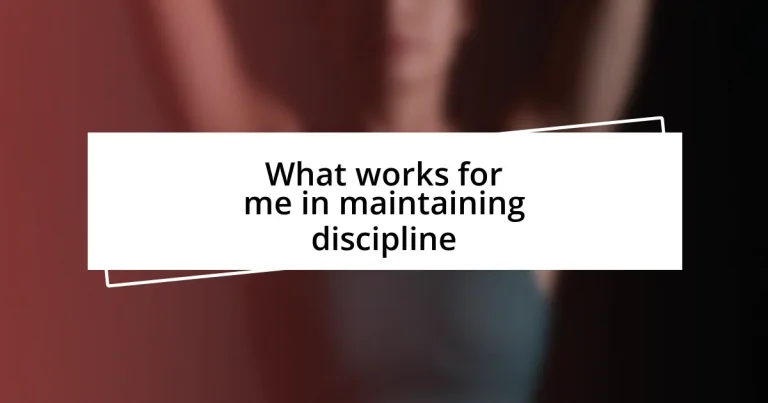Key takeaways:
- Personal discipline involves aligning daily actions with long-term goals and breaking tasks into manageable steps to reduce overwhelm.
- Key principles of self-discipline include clarity of goals, establishing routines, positive reinforcement, regular reflection, and surrounding oneself with supportive individuals.
- Effective daily habits, like planning ahead, time blocking, and taking breaks, can significantly enhance focus and productivity.
- Reflecting on progress and making adjustments based on insights can improve resilience and maintain motivation in the pursuit of goals.
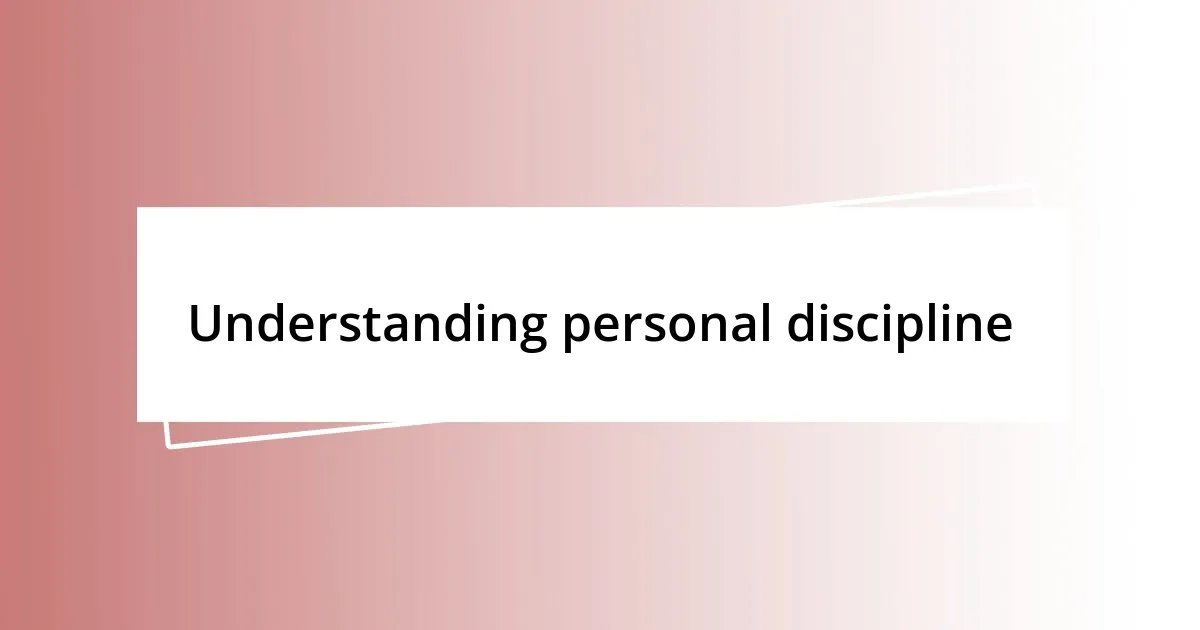
Understanding personal discipline
Understanding personal discipline means recognizing that it’s not just about adhering to a strict set of rules; it’s about aligning my daily actions with my long-term goals. I still vividly remember a time when I struggled with procrastination. I would ask myself, “Why is it so hard to just start?” Eventually, I realized that acknowledging my feelings of overwhelm helped me take that first step, turning anxiety into motivation.
At one point, I decided to break my goals into smaller, manageable tasks. It was a game-changer for me! Instead of viewing my writing project as an insurmountable mountain, I saw it as a series of small hills, each climb offering a sense of achievement. How many times have you felt overwhelmed by the big picture? It’s easy to lose sight of our capabilities when we focus on the entirety of the task.
Personal discipline also requires a strong sense of self-awareness. I’ve learned that understanding my triggers—like late-night scrolling on my phone—has been essential in maintaining focus. Have you ever noticed how certain environments or habits can derail your progress? For me, curating my workspace to reduce distractions has kept me grounded and purposeful in pursuing my daily objectives.
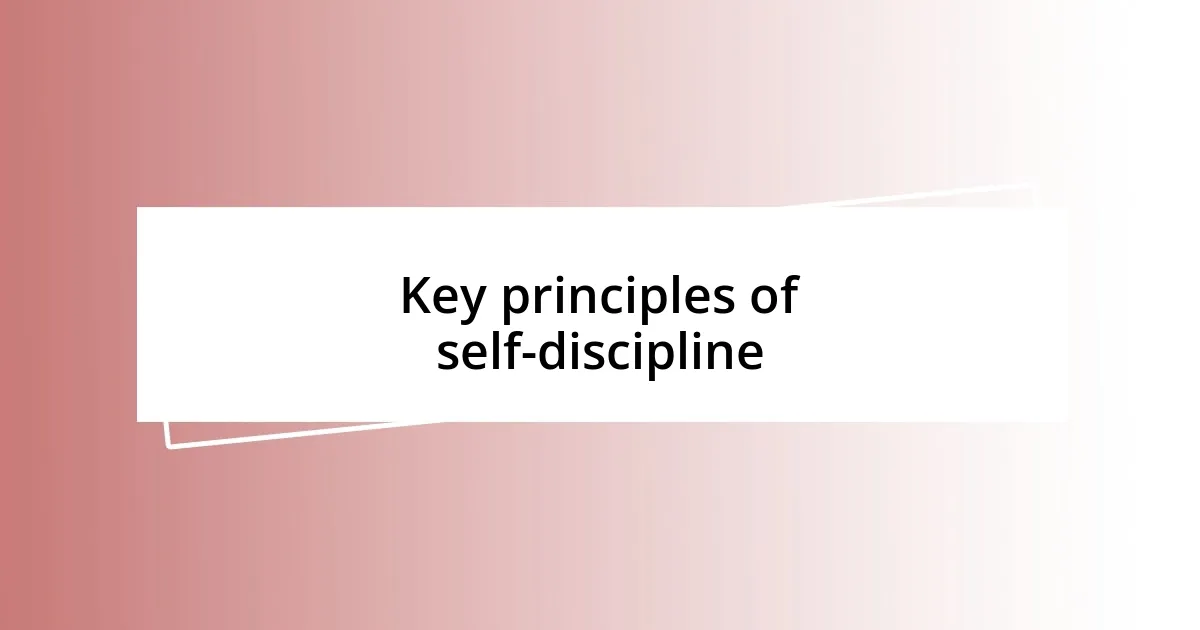
Key principles of self-discipline
Self-discipline thrives on a set of principles that act as guiding stars. One of the most powerful lessons I learned is the importance of consistency. I remember a phase when I dedicated just ten minutes a day to a challenging task. Over time, those ten minutes transformed into an hour, leading to significant progress. It’s fascinating how small, consistent efforts can build momentum and shape habits.
To help reinforce my self-discipline, I’ve embraced these key principles:
- Clarity of Goals: I always make my goals specific and attainable. Vague objectives can lead to confusion and inaction.
- Routine Establishment: I find that setting a structured daily routine creates predictability, which cushions me against outside distractions.
- Positive Reinforcement: I reward myself for sticking to my plans, which turns the journey into something enjoyable. I remember treating myself to a refreshing smoothie after a week of hitting my targets—it made all the effort feel worthwhile!
- Reflection and Adjustment: Regularly assessing my progress helps me identify what works and what doesn’t, allowing me to tweak my strategies when needed. I think of it as a GPS recalibrating my route to success.
- Surrounding Myself with Support: Engaging with others who share similar goals has been incredibly uplifting—it’s a reminder that I’m not alone in this journey.
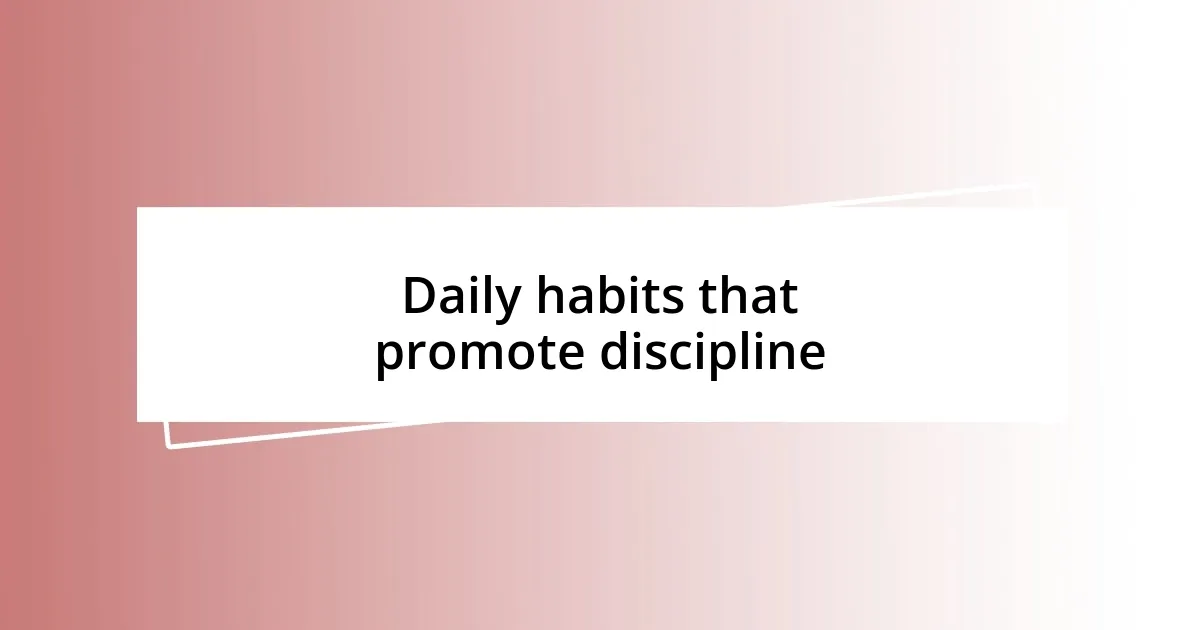
Daily habits that promote discipline
Establishing daily habits that drive discipline has been a transformative experience for me. One particular practice is planning my day the night before. I often sit down with a cup of herbal tea and outline my top three priorities. This simple ritual not only helps my mind unwind but also provides clarity on what needs to be accomplished. Have you ever noticed how much easier it is to tackle tasks when you wake up with a plan?
Another habit that promotes discipline is the practice of time blocking. I learned to allocate specific chunks of my day to different tasks, treating these blocks like important appointments. Initially, I’d get distracted and let time slip away, but the structure of time blocking has kept me on track. It’s fascinating to observe how this level of organization not only boosts productivity but also lessens the guilt of not completing everything at once.
Lastly, incorporating short breaks has significantly enhanced my focus. I’ve adopted the Pomodoro technique, where I work for 25 minutes and then take a 5-minute break. During those breaks, I step outside for a breath of fresh air or do a quick stretching routine. Surprisingly, I find that stepping away allows me to return to my work feeling rejuvenated and ready to dive back in. How often do we underestimate the power of a brief pause?
| Habit | Description |
|---|---|
| Planning the Night Before | Detailing top priorities before sleeping enhances clarity for the next day. |
| Time Blocking | Allocating designated periods for specific tasks prevents distractions and maintains focus. |
| Incorporating Breaks | Utilizing techniques like Pomodoro improves concentration and revitalizes energy. |
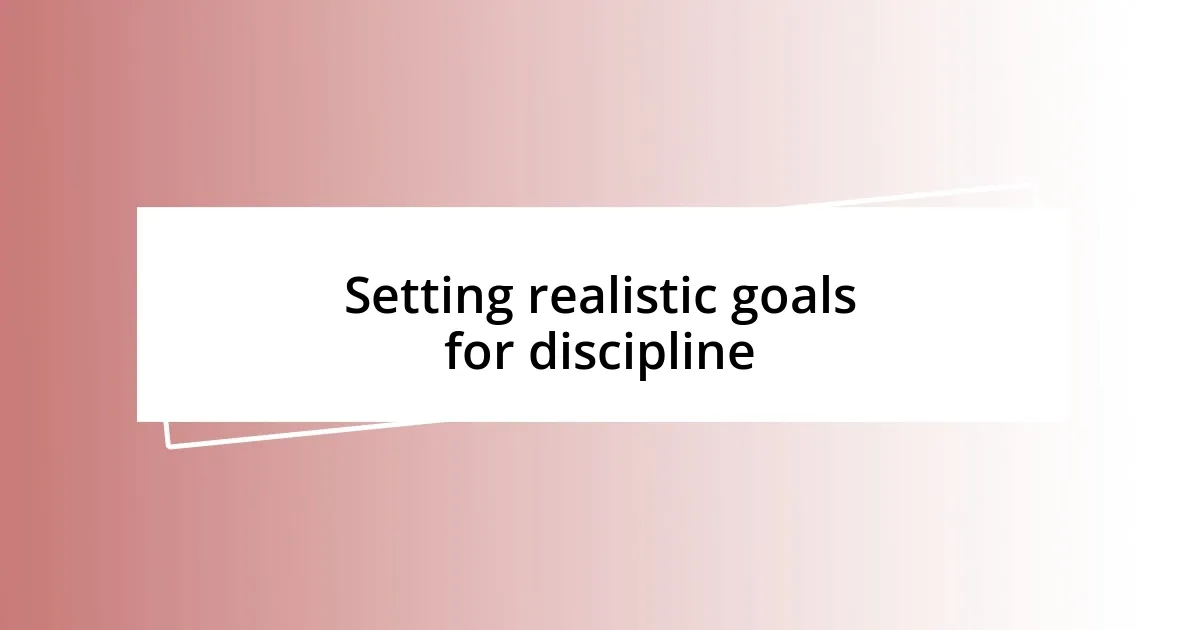
Setting realistic goals for discipline
Setting realistic goals is essential for fostering discipline. I’ve often found myself overwhelmed by lofty ambitions that felt more like wild dreams than achievable milestones. For instance, I once aimed to run a marathon without building up to it gradually. Unsurprisingly, I burned out early in my training. Realistic goals provide a sturdy foundation for success, turning big aspirations into manageable steps.
When I define my goals, I make a point to break them down into smaller, actionable tasks. Recently, I set a goal to read 12 books in a year. Instead of overwhelming myself with that grand vision, I aimed for just one book a month. This clarity transformed an intimidating objective into something I looked forward to. It’s amazing how small victories can motivate you to keep going. Have you ever felt the rush of accomplishment from completing a simple task?
Another key insight I’ve embraced is to be flexible with my goals. Life has its twists and turns, and sometimes things don’t go as planned. I remember a time when I intended to write a chapter every week but found myself struggling with creative blocks instead. Adjusting my goal to writing just 500 words a day kept the progress flowing without the pressure. It taught me that flexibility cultivates resilience, making discipline more of a partnership rather than a battle.
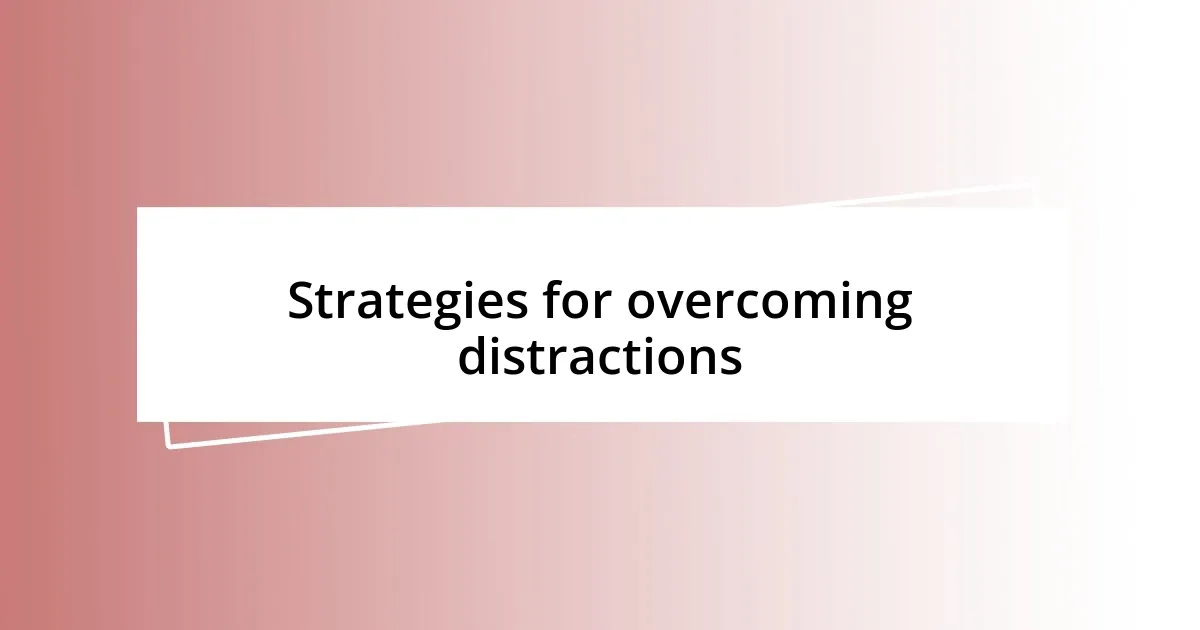
Strategies for overcoming distractions
Distractions can be formidable foes when trying to maintain discipline, but I’ve discovered a few strategies that really work for me. One of my go-to tactics is creating an environment conducive to focus. I’ve found that decluttering my workspace and minimizing visual distractions—like turning off notifications on my phone—has made a world of difference. Have you ever noticed how a tidy space can clear your mind?
Another effective approach revolves around setting designated ‘distraction-free’ times. For example, I dedicate certain hours solely to deep work, during which I avoid social media or any non-essential tasks. Initially, I thought it would be challenging, but I soon realized that this commitment allowed me to dive deeply into my projects. What if you set aside two hours a day just for your most important tasks? You might be surprised at how much you can accomplish!
Lastly, I’ve learned to embrace the power of mindfulness. Taking a few moments to practice deep breathing or meditation before starting my work helps me center my thoughts. I vividly remember one particular day when I felt overwhelmed, but just five minutes of mindful breathing transformed my chaotic mindset into clarity. Isn’t it interesting how a little focus on the present can pave the way for a more productive day?
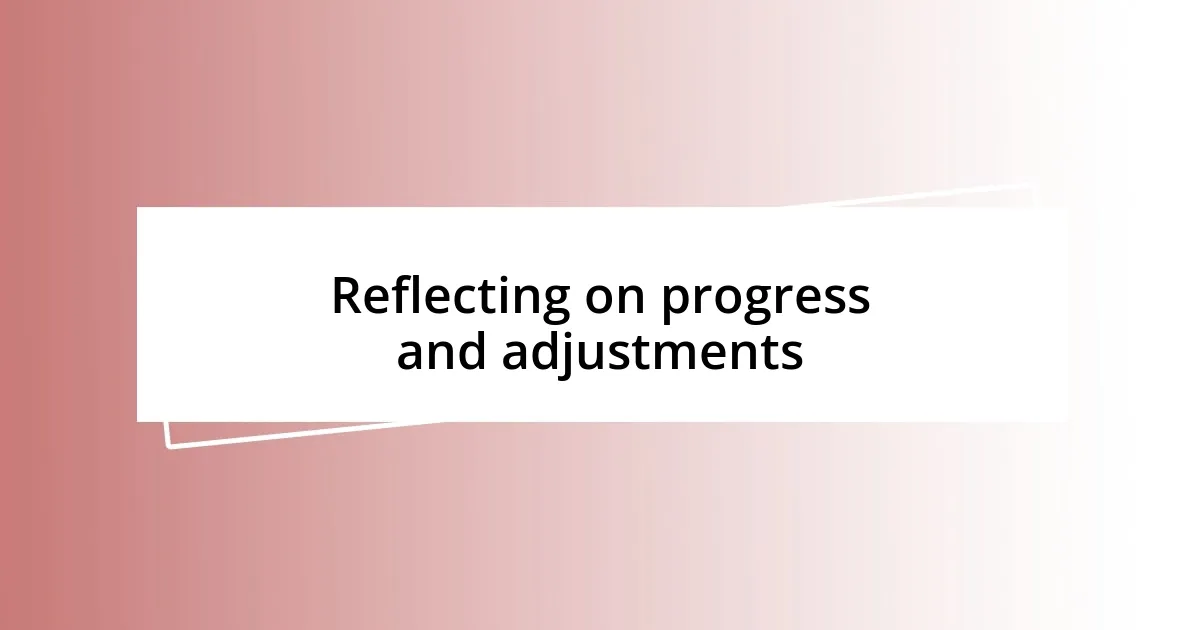
Reflecting on progress and adjustments
Reflecting on my progress is a habit I’ve fostered over the years, and I can’t emphasize enough its importance in maintaining discipline. My favorite method is to keep a simple journal where I note what I accomplished each week. There’s something incredibly satisfying about flipping back through those entries. Have you ever taken a moment to appreciate how far you’ve come? This exercise not only highlights my successes but also brings to light areas where adjustments are needed.
Sometimes, honest reflection reveals surprising insights. For instance, after a month of disciplined writing, I discovered that my energy levels dipped significantly on Fridays. Rather than pushing through, I decided to adjust my schedule and focus on lighter tasks that day. Adjusting my approach saved me from burnout and kept my creativity flowing. Doesn’t it feel great when you realize that a small tweak can lead to more sustainable progress?
Moreover, I’ve found that engaging with a mentor or a supportive friend can enhance this reflective process. A few months ago, I shared my insights with a colleague, and it opened my eyes to potential strategies I hadn’t considered. Having someone else’s perspective can be a game changer. When was the last time you sought feedback on your progress? It’s a conversation worth having.












